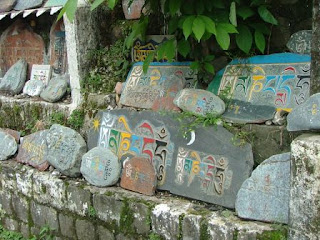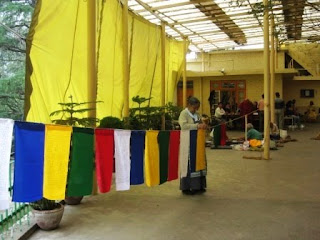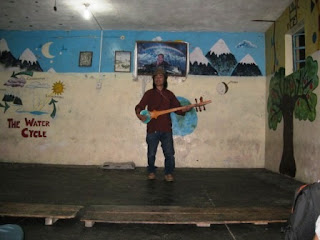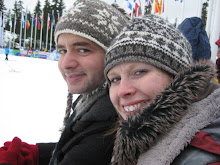
We're now at the end of a 4-day stay in McLeod Ganj, the town just north of Dharamsala, and home of the Dalai Lama and Tibetan government in exile. We weren't quite sure what to expect from McLeod Ganj before coming. We knew that it houses a large number of Tibetan refugees as well as a large number of backpackers and the usual Bob Marley posters and banana milkshakes that come with that, and it seemed like a strange mix.
And it is a bit of a strange place, and sad as well. I like towns with large numbers of monks going about their daily business: talking on cell phones, ordering tea, or reciting English words from a notebook. But in this case they are only here because of the situation in Tibet, and there are constant reminders of that around town, such as posters calling for boycotts of Chinese goods and flyers for showings of political documentaries. With most of our experience in Tibetan areas coming from our travels in China, seeing pictures of the Dalai Lama openly displayed in public is a shock in itself.
As a town, we haven't been too fond of McLeod Ganj. It is not a peaceful place, with the same small lanes with big jeeps we've seen in other cities in this part of the country. We arrived pretty worn out from our adventure in the Himalayas, and have actually spent a lot of time in our room reading or watching TV, or eating at a great restaurant just down the road. Which has actually been rather nice. Because McLeod Ganj is so well set-up for travelers there are many language classes, Buddhism or yoga classes, and opportunities to teach English or otherwise volunteer with refugees, but fewer one or two-day activities. We did visit the large temple in the compound where the Dalai Lama lives, but with the large crowds of pilgrims I felt slightly intrusive, and embarrassed by some of the over-eager tourists who put cameras right in the faces of people praying.
Tonight, however, we did have a very worthwhile experience. We'd read about Tibetan folk music performances put on in a room at a local school on some nights, and decided to attend. It was a simple affair: about 8 people in attendance, low wooden benches for seats, and just two solo musicians. One, a man named Karma, was also the host. He was born in Tibet but fled China at a young age, after his parents died in prison. These performances were his attempt to help Tibetans preserve their culture. For example, in Tibet each family owns musical instruments and the skills are passed down to each generation, but in India the cost of instruments and music lessons in their new home is prohibitively expensive to most Tibetans, and the younger generations are more drawn to pop music anyway.
Karma gave helpful explanations in English of each song as an introduction, and sang two or three songs unaccompanied. The music was haunting and often sad; one song had been penned by the Dalai Lama's teacher soon after escaping China as a tribute to the many Tibetans killed. However, most of the songs were performed by a young man Karma had discovered who had left China only a few weeks ago. They even had trouble communicating with one another, because they were originally from different areas and each spoke different dialects of Tibetan. He accompanied his songs with either a deep, long-necked stringed instrument or a smaller instrument that resembled a mandolin. One song had been written by a previous Dalai Lama, the sixth, who was famous for music and poetry. The music was simple but powerful, and it was the first thing we had done here that gave us a more tangible connection to what this place is about.

leaving a birthday message for the Dalai Lama (his birthday was the 6th)

at the temple

prayer wheels, which are spun as you walk around clock-wise


a woman sewing prayer flags onto a line

people making prayer flags by pressing blank ones onto an ink stone


an Indian holy man we passed on a walk, hoping to sell us enlightenment

how are we supposed to walk to our hotel with all these monkeys around

the Tibetan musician

No comments:
Post a Comment